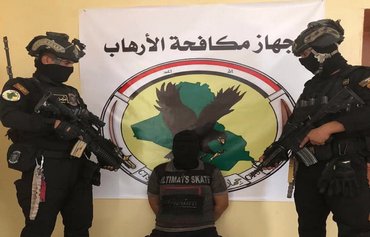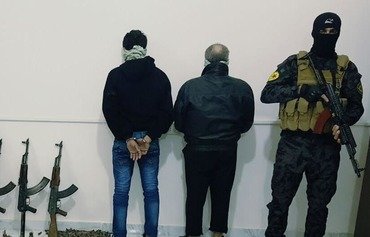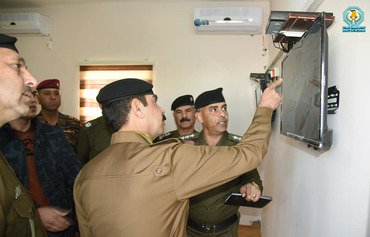Urban sleeper cells of the "Islamic State of Iraq and Syria" (ISIS) are in sharp decline in Anbar province, thanks to the efforts of Iraqi forces to eliminate them and the vigilance of local residents, officials told Diyaruna.
"Following its defeat, ISIS heavily relied on its sleeper cells to stir up trouble in liberated areas," said Anbar provincial council member Naim al-Koud.
"The terrorists were planning on returning to their secret activities with a vengeance, by giving these cells free reign and turning them into a direct threat to civilians and a roadblock to stability and reconstruction," he told Diyaruna.
Ongoing security campaigns and the vigilance of the civilian population have thwarted these plans, he said, with security forces and intelligence agencies "actively hunting down ISIS secret agents and monitoring their movements".
![An Iraqi soldier patrols a street in Anbar province. [Photo courtesy of the Anbar police]](/cnmi_di/images/2018/11/22/15343-Iraq-Anbar-soldier-600_384.jpg)
An Iraqi soldier patrols a street in Anbar province. [Photo courtesy of the Anbar police]
Several dangerous terrorist networks have been taken down that had been hiding among the civilian population, while communicating with their leaders and receiving plans and orders from them to carry out attacks, he said.
"Iraqi forces have achieved significant progress in this regard, thanks to the support of the local population, since most of these cells were captured due to detailed information from civilians," he added.
Anbar residents suffered firsthand from the brutality of terrorism, he said, and now understand that the security of their cities is a shared responsibility.
Multiple arrests
During the first two weeks of November, Iraqi intelligence agencies in Anbar arrested 17 individuals wanted in connection with suspected terror activity in Ramadi, Fallujah, al-Karma, al-Saqlawiyah, Amiriyat al-Fallujah and al-Rutba.
Local informants provided the intelligence that led to their capture.
On November 5th, Anbar police announced they had detained an ISIS sleeper cell in Fallujah made up of three dangerous extremists: Mudhar Abdul Hadi Aswad Fadhil, Barakat Malouki Mohammed Fadhil and Thiyab Mushrif Awad.
The three had been responsible for detonating a car bomb and staging several attacks using improvised explosive devices (IEDs) and sticky bombs targeting civilians, security personnel and a judge who tries terrorism cases.
The cell was managed and funded by an Erbil-based ISIS commander, Mohammed Younis Mohammed Fadhil, who was later apprehended in that city.
Uncovering this cell is "the latest success" that crowns the series of achievements security forces have made in their efforts to eradicate ISIS sleeper cells, Fallujah mayor Issa al-Sayer told Diyaruna.
"ISIS cells are falling one after the other into the hands of our forces," he said, adding that the group has lost control over them and has lost the ability to recruit other members to make up for the ones they are losing.
Limiting the threat
Security forces have been highly effective in limiting the threat posed by extremists hiding out in the province's cities, al-Sayer said.
Some may remain, he conceded, "but there cannot be many of them, nor can they move freely and pose a severe security threat".
"ISIS members are fully rejected by the locals and they have no safe place in Fallujah," al-Sayer added. "Building trust between the civilian population and the security forces is vital to maintaining stability."
"ISIS activity is on the decline thanks to the proactive measures of the security forces," Anbar provincial council member Athal al-Fahdawi told Diyaruna.
"Things are going in the right direction, and the police, army, intelligence agencies and tribes are all doing their job in securing their cities," he said.
"The danger has subsided, but it is still there," he added. "We need to increase security operations and continue the strong partnership with the local civilian population."

![Anbar police commander Hadi Kassar Erzaij announces the arrest of an ISIS sleeper cell in Fallujah during a November press conference. [Photo courtesy of the Anbar police]](/cnmi_di/images/2018/11/22/15342-Iraq-Anbar-police-600_384.jpg)






